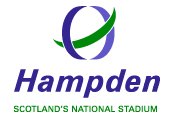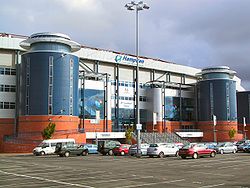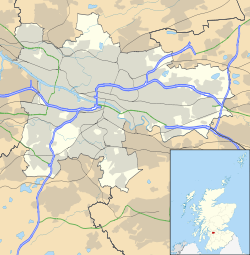Hampden Park
| Hampden Park | |
|---|---|
 |
|
 |
|
 |
|
| Location | Mount Florida, Glasgow, Scotland |
| Coordinates | |
| Opened | 1903 |
| Renovated | 1999 |
| Capacity | 52,103 |
Hampden Park in Glasgow is Scotland's national stadium. Its primary use is as the home to Queen's Park F.C., the Scotland national football team and Scottish cup finals. It is also used for music concerts and other sporting events.
Hampden was built in 1903, though all signs of the original stadium are long gone. It celebrated its centenary on 31 October 2003. The stadium also houses the offices of the Scottish Football Association, SPL and Scottish Football League. Hampden has hosted prestigious sporting events, including three Champions League finals and a UEFA Cup final. It held UEFA five-star stadium status which was superseded by a new system of classification.
Glasgow was officially selected as the host city for the 2014 Commonwealth Games in November 2007 and Hampden will be the key stadium. It will host football games during the early stages of the commonwealth football tournament and it will also host the athletics track and field events.
The stadium is served by the nearby Mount Florida railway station.
Contents |
History
The first two Hampdens
Queen's Park have played at a venue called Hampden Park since 1873. When Queen's Park moved to the third (and current) Hampden Park, the second Hampden was sold to Third Lanark A.C. and renamed New Cathkin Park. The site of the first Hampden Park 1873–1884 is on the site of the present day Hampden Bowling Club.[1] The second Hampden Park (Cathkin Park) is just across the Cathcart Road. Queen's Park played there from 1884–1903.[2]
The present Hampden
In 1903, Queen's Park decided to purchase land in the Mount Florida area of Glasgow's south side. The first match at the present Hampden Park was played on 31 October 1903, when Queen's Park recorded a 1–0 win over Celtic.[3] Hampden Park was the largest stadium in the world until 1950, when the Maracanã in Rio de Janeiro was completed.
After the release of the Taylor Report in the wake of the Hillsborough disaster, among other football tragedies, Hampden Park was converted to be all-seater. The need to improve safety led to its most recent renovation in the late 1990s. The stadium was re-opened on 14 May 1999, with a capacity of 52,103.
Some aspects of the stadium design have been criticised, as supporters sitting in the stands behind the goals are a long distance from the pitch. The SFA have discussed plans to address this problem and to increase Hampden's capacity to at least 70,000.[4]
The Hampden Roar
The crowd who came to see football matches at Hampden were renowned for creating the Hampden Roar. The noise terrified opposing teams who came to play there. With capacity at the ground exceeding 100,000 from the early 1900s until the 1980s, the Roar could be heard several miles away from the stadium. In recent times the roar has become more muted, due to the modern capacity of the stadium being reduced.
The Hampden roar originated during the annual fixture against England in 1929, when Scotland, having played the whole of the second half with ten players, owing to an injury to Alex Jackson, equalised in the final minute with a goal scored by Alec Cheyne (Who played for Aberdeen FC at the time) direct from a corner kick. Over 110,000 spectators attended the match, and they began the roar as a way of inspiring Scotland to hold on until the final whistle.[5]
The Hampden Roar is also used, colloquially, as a rhyming slang phrase. People (mainly in Glasgow and the west coast of Scotland) may ask "what's the Hampden Roar?" or "what's the Hampden?" meaning, "what's the score?" The phrase can also be used outwith footballing contexts.
The use of the Hampden Roar is also heard in the official Heart of Midlothian song, with the lyrics: "If I had the time I could name dozens more, who have helped in producing the old Hampden Roar."
Events at Hampden Park

Football
The Scottish Cup Final is played at Hampden annually in May, for the honour of lifting the world's oldest national trophy – the Scottish Football Association Challenge Cup, made in 1873. Queen's Park were the first winners, beating Clydesdale 2–0 in the 1874 final.
Hampden Park hosted the 1960 European Cup final between Real Madrid and Eintracht Frankfurt, where over 130,000 people watched Real Madrid win 7–3. The 1976 final was also held at Hampden, when FC Bayern Munich defeated AS Saint-Etienne. Real Madrid were again victorious when Hampden Park hosted the final of the UEFA Champions League in 2002, defeating Bayer Leverkusen, aided by Zinedine Zidane's legendary "wonder goal". Hampden Park also hosted the 2007 UEFA Cup Final on 16 May when Sevilla defeated Espanyol to retain the trophy. It also held famous wins for the Scotland national football team, such as the 1–0 wins over Netherlands in November 2003, and against France in October 2006. Diego Maradona scored his first international goal at Hampden Park, against Scotland, in 1979.
Notable matches
- 1960: Real Madrid 7 – Eintracht Frankfurt 3 (final, European Cup)
- 1962: Atlético Madrid 1 – Fiorentina 1 (final, European Cup Winners' Cup)
- 1966: Borussia Dortmund 2 – Liverpool 1 (final, European Cup Winners' Cup)
- 1967: Celtic F.C. 1 – Racing Club de Avellaneda 0 (final first match, Intercontinental Cup (football))
- 1976: Bayern Munich 1 – AS Saint-Etienne 0 (final, European Cup)
- 1989: Saudi Arabia 2 – Scotland 2 (aet; 5–4 pens) (final, FIFA U-16 World Championship)
- 2002: Real Madrid 2 – Bayer Leverkusen 1 (final, UEFA Champions League)
- 2007: Sevilla 2 – Espanyol 2 (aet; 3–1 pens) (final, UEFA Cup)
One event which is mistakenly thought to have occurred at Hampden Park is the world's first football international. This happened at the West of Scotland Cricket Club's Hamilton Crescent ground in the Partick area of Glasgow.
Stadium records
Among the British and European capacity records Hampden holds are:
- 1937 – Attendance 149,415 : Scotland v England (British Home Championship) – highest in Europe
- 1937 – Attendance 146,433 : Celtic v Aberdeen (Scottish Cup Final) – highest for a club match in Europe
- 1970 – Attendance 136,505 : Celtic v Leeds United (European Cup Semi-Final) – highest for a UEFA competition match
Rugby union
Hampden Park has held four full cap international matches, the first in 1906.
| Date | Competition | Home team | Away team | ||
|---|---|---|---|---|---|
| 17 November 1906 | 1906 Autumn International Series | 6 | South Africa | 0 | |
| 28 August 1999 | Friendly (Warmup match for 1999 Rugby World Cup) | 60 | 19 | ||
| 15 October 1999 | 1999 Rugby World Cup (Pool 1) | 39 | 3 | ||
| 20 November 2004 | 2004 Autumn International Series | 17 | 31 | ||
Other sports
In American football, the Scottish Claymores of NFL Europe played at the stadium between 1998 and 2004 before decamping to Hamburg to become the Hamburg Sea Devils. The league's championship game, the World Bowl, was held there in 2003. In that game, the Frankfurt Galaxy beat Rhein Fire.
In 2000 Hampden was the venue for a boxing card headlined by former world champion Mike Tyson.
Glasgow was announced as the host city for the 2014 Commonwealth Games in November 2007, and Hampden will host the athletics events.
Hampden was also home to the Glasgow Tigers speedway team from 1969 until 1972. The speedway track ran round the outside of the football pitch and had a removable fence to facilitate football crowds viewing from the base of the terracing.
Lesser Hampden
Lesser Hampden is a football stadium in Glasgow, Scotland, which is located immediately beside the western end of Hampden Park.
Concerts
Hampden also plays host to many concerts during the summer. It can hold up to 55,000 with the side stage or 90,000 with the end stage.
Concerts include:
- The Rolling Stones – Urban Jungle Tour – 9 July 1990 & A Bigger Bang Tour – 25 August 2006
- Rod Stewart – 3 July 1999 & 6 July 2007
- Tina Turner – Twenty Four Seven Tour – 7 July 2000
- Bon Jovi – One Wild Night Tour – 8 June 2001, Have a Nice Day Tour – 3 June 2006 & Lost Highway Tour – 21 June 2008
- The Eagles – 2001 World Tour – 22 July 2001, Farewell I Tour – 23 June 2006 & The Long Road out of Eden Tour – 4 July 2009
- Robbie Williams – Weddings, Barmitzvahs & Stadiums Tour – 4–5 August 2001 & Close Encounters Tour – 1–2 September 2006
- Eminem, Obie Trice, Xzibit, D12 & Cypress Hill – The Anger Management European Tour – 24 June 2003
- Live & Loud – 27 July 2003, 20 June 2004 & 26 June 2005
- U2 – Vertigo Tour – 21 June 2005 & U2360° Tour – 18 August 2009
- Oasis – 29 June 2005
- George Michael – 25 Live Tour – 17 June 2007
- Red Hot Chili Peppers – 23 August 2007
- Neil Diamond – 5 June 2008
- Take That – Take That Present: The Circus Live Tour – 19–21 June 2009
- AC/DC – Black Ice World Tour – 30 June 2009
- Bruce Springsteen & The E Street Band – Working on a Dream Tour – 14 July 2009
- Coldplay, Jay-Z & White Lies – Viva la Vida Tour – 16 September 2009
- Paul McCartney – Up and Coming Tour – 20 June 2010
- P!nk – Funhouse Summer Carnival Tour – 26 June 2010
See also
- List of host grounds of Scotland home international football matches
- Hampden in the sun
References
- ↑ Virtual Earth map
- ↑ Virtual Earth map
- ↑ THE CURRENT HAMPDEN, 1903 to 1980, Queen's Park official site
- ↑ "Revamped Hampden to get 70,000 Seats". http://www.sundaymail.co.uk/sport-news/scottish-football/international-football/2007/10/21/revamped-hampden-to-get-70-000-seats-78057-19984869.
- ↑ Webster, Jack (2003). The First 100 Years of The Dons: the official history of Aberdeen Football Club 1903–2003. Hodder and Stoughton. pp. 122–123. ISBN 0 340 82344 5.
External links
- Official Hampden Website
- Hampden Roar – The History of Hampden Park
- Unofficial history of Hampden Park
- Pictures of the demolition of Hampden Park to allow for the building of the modern stadium
- The Scottish Football Association, which holds office here
- Photographs of Hampden Stadium in Glasgow
- Queen's Park F.C. official website
- BBC News: Hampden celebrates centenary
|
|||||
|
|||||
|
|||||||||||||||||
|
||||||||||||||
|
|||||||||||||||||||||||||||||
|
||||||||
|
|||||
| Preceded by Neckarstadion Stuttgart |
European Cup Final Venue 1960 |
Succeeded by Wankdorf Stadium Bern |
| Preceded by Two-legged final |
UEFA Cup Winners' Cup Final Venue 1962 |
Succeeded by De Kuip Rotterdam |
| Preceded by Wembley Stadium London |
UEFA Cup Winners' Cup Final Venue 1966 |
Succeeded by Frankenstadion Nuremberg |
| Preceded by Parc des Princes Paris |
European Cup Final Venue 1976 |
Succeeded by Stadio Olimpico Rome |
| Preceded by San Siro Milan |
UEFA Champions League Final Venue 2002 |
Succeeded by Old Trafford Manchester |
| Preceded by Philips Stadion Eindhoven |
UEFA Cup Final Venue 2007 |
Succeeded by City of Manchester Stadium Manchester |